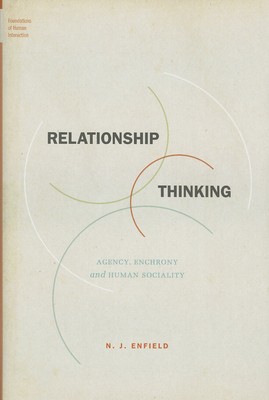
- We will send in 10–14 business days.
- Author: N J Enfield
- Publisher: Oxford University Press, USA
- ISBN-10: 0199338736
- ISBN-13: 9780199338733
- Format: 15.8 x 23.6 x 2.8 cm, hardcover
- Language: English
- SAVE -10% with code: EXTRA
Reviews
Description
In Relationship Thinking, N. J. Enfield outlines a framework for analyzing social interaction and its linguistic, cultural, and cognitive underpinnings by focusing on human relationships. This is a naturalistic approach to human sociality, grounded in the systematic study of real-time data from social interaction in everyday life. Many of the illustrative examples and analyses in the book are a result of the author's long-term field work in Laos.
Enfield promotes an interdisciplinary approach to studying language, culture, and mind, building on simple but powerful semiotic principles and concentrating on three points of conceptual focus. The first is human agency: the combination of flexibility and accountability, which defines our possibilities for social action and relationships, and which makes the fission and fusion of social units possible. The second is enchrony: the timescale of conversation in which our social relationships are primarily enacted. The third is human sociality: a range of human propensities for social interaction and enduring social relations, grounded in collective commitment to shared norms. Enfield's approach cuts through common dichotomies such as 'cognitive' versus 'behaviorist', or 'public' versus 'private', arguing instead that these are indispensable sides of single phenomena. The result is a set of conceptual tools for analyzing real-time social interaction and linking it with enduringrelationships and their social contexts. The book shows that even - or perhaps especially - the most mundane social interactions yield rich insights into language, culture, and mind.
EXTRA 10 % discount with code: EXTRA
The promotion ends in 20d.23:09:07
The discount code is valid when purchasing from 10 €. Discounts do not stack.
- Author: N J Enfield
- Publisher: Oxford University Press, USA
- ISBN-10: 0199338736
- ISBN-13: 9780199338733
- Format: 15.8 x 23.6 x 2.8 cm, hardcover
- Language: English English
In Relationship Thinking, N. J. Enfield outlines a framework for analyzing social interaction and its linguistic, cultural, and cognitive underpinnings by focusing on human relationships. This is a naturalistic approach to human sociality, grounded in the systematic study of real-time data from social interaction in everyday life. Many of the illustrative examples and analyses in the book are a result of the author's long-term field work in Laos.
Enfield promotes an interdisciplinary approach to studying language, culture, and mind, building on simple but powerful semiotic principles and concentrating on three points of conceptual focus. The first is human agency: the combination of flexibility and accountability, which defines our possibilities for social action and relationships, and which makes the fission and fusion of social units possible. The second is enchrony: the timescale of conversation in which our social relationships are primarily enacted. The third is human sociality: a range of human propensities for social interaction and enduring social relations, grounded in collective commitment to shared norms. Enfield's approach cuts through common dichotomies such as 'cognitive' versus 'behaviorist', or 'public' versus 'private', arguing instead that these are indispensable sides of single phenomena. The result is a set of conceptual tools for analyzing real-time social interaction and linking it with enduringrelationships and their social contexts. The book shows that even - or perhaps especially - the most mundane social interactions yield rich insights into language, culture, and mind.


Reviews